Obligations and special contracts 29 results
-

Standard Business Contracts
5th editionBook | 5th edition 2025 | Europe, United Kingdom | Dirk Deschrijver, Marc Taeymans, Olivier Vanden BergheThis reference book brings together a number of contracts that are governed by Belgian law but drafted in English. Each model is preceded by a short introduction summarizing the most salient provisions of Belgian law relevant to that particular contract. Also, in most models, different options and alternative wording are included.
€250.00 incl. VAT -

Legal Aspects of Contracts and Third Parties
On Third-Party Rights, Transfer of Rights, Agency and ContractsBook | 1st edition 2024 | Europe, United Kingdom | Jan Biemans, Lorna RichardsonThis volume discusses the position of third parties in relation to contracts in a comparative context, focusing on third-party clauses in contracts, transfer of contractual rights after transfer of property and assignment, principal–agent relations in concluding and performing contracts, and creditor protection (actio Pauliana).
€155.00 incl. VAT -

European Sales Law
Challenges in the 21st CenturyBook | 1st edition 2023 | Stefan Grundmann, Yesim M. Atamer20 years after the 1999 EU sales law harmonization an extensive and future oriented reform has occurred with the 2019 Sale of Goods Directive. The reform infused features of durability, sustainability and digitalisation into classical sales law, transforming the contract into a long-term relationship, also forcing an adaptation of distribution networks.€202.00 incl. VAT -

Artificial Intelligence and the Law (2nd edition)
Second revised editionBook | 2nd edition 2023 | Belgium | Jan De Bruyne, Cedric VanleenhoveIn this comprehensive book, scholars critically examine how AI systems may impact Belgian law. While specific topics of Belgian private and public law are thoroughly addressed, the book also provides a general overview of a number of regulatory and ethical AI evolutions and tendencies in the European Union. In this second edition various chapters have been updated to reflect recent developments in the field. Two chapters covering media law and competition law have also been added.
€180.00 incl. VAT -
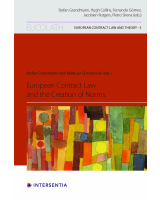
European Contract Law and the Creation of Norms
Book | 1st edition 2021 | Europe | Stefan Grundmann, Mateusz GrochowskiThe book sketches a broad landscape of sources of modern contract law, with particular regard to EU private law rules. It provides for a better understanding of the identity of present-day contract law by analysing the multitude of social and economic dynamics that shape its normative landscape.€123.00 incl. VAT -

Immoral Contracts in Europe
Book | 1st edition 2020 | Europe | Aurelia Colombi Ciacchi, Chantal Mak, Zeeshan MansoorThis book brings together a group of renowned contract lawyers to analyse how their own legal systems deal with twelve cases of morally dubious agreements. It explores questions of validity, enforceability and the availability of remedies, while offering crucial insights into the divergences and converges between different European legal systems.€182.00 incl. VAT -

Interpretation of Commercial Contracts in European Private Law
Book | 1st edition 2020 | United Kingdom | C.J.W. Baaij, David Cabrelli, Laura MacgregorThis book is a unique and extensive comparative study of commercial contract interpretation across 14 selected jurisdictions, namely Croatia, England and Wales, Finland, France, Germany, Greece, Italy, The Netherlands, Poland, Portugal, Scotland, South Africa, Spain and Sweden. Using a dynamic comparative case method, the focus is centered on the discussion of key legal problems, further examined in a detailed and comprehensive comparative analysis. Contributions written from a law and economics, and European private law perspectives place the key legal issues into context and make Interpretation of Commercial Contracts in European Private Law a coherent and valuable resource for academics and practitioners with a European or International focus.€161.00 incl. VAT -

Contract and Property with an Environmental Perspective
Book | 1st edition 2020 | United Kingdom | Siel Demeyere, Vincent SagaertThis book includes the conference proceedings of a conference in September 2019. The Institute for Property Law of the University of Leuven had the opportunity to welcome numerous authoritative legal scholars to debate on the impact of sustainability challenges on the crossroads between contract and property. The contributions in this book are on the one hand, careful analyses of national laws, and on the other hand, more general views on the interplay between property law and sustainability.€84.00 incl. VAT -

Real Obligations at the Edge of Contract and Property
Book | 1st edition 2020 | Belgium | Siel DemeyereThis book extensively analyses obligations connected to property rights, or 'real obligations', in a comparative perspective through a study of Belgian, French, Dutch and Scots law. Examples of real obligations are the periodical payment obligation of a long lease holder, the maintenance of the property subject to a servitude and the financial contributions by apartment owners.€216.00 incl. VAT -
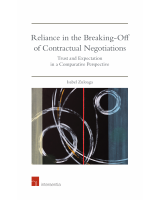
Reliance in the Breaking-Off of Contractual Negotiations
Trust and Expectation in a Comparative PerspectiveBook | 1st edition 2019 | United Kingdom | Isabel ZuloagaThis book explores the theoretical basis of precontractual liability for the breaking-off of contractual negotiations and after a comparative analysis of common law (England) and civil law jurisdictions (Germany, France and Chile), argues in favour of a shift from good faith to the notion of reliance.€90.00 incl. VAT -

The Borderlines of Tort Law
Interactions with Contract LawBook | 1st edition 2019 | United Kingdom | Miquel Martin-CasalsThis volume explores how differences between tort and contract affect the foundations of liability, the nature and amount of the compensation, the extent of liability and whether defences and limitation periods corresponding to the distinct causes of action give rise to substantially different outcomes.€111.00 incl. VAT -
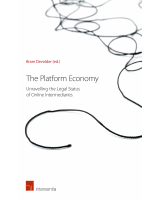
The Platform Economy
Unravelling the Legal Status of Online IntermediariesBook | 1st edition 2019 | Europe | Bram DevolderIn this book, a panel of international legal experts unravel the legal status of online intermediaries - a thorny knot that legislators, judges and lawyers across the globe are facing.€125.00 incl. VAT -
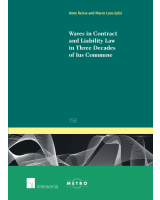
Waves in Contract and Liability Law in Three Decades of Ius Commune
Book | 1st edition 2017 | United Kingdom | Anne L.M. Keirse, Marco Loos, Marco B.M. LoosThis book revolves around major legal developments in the fields of European contract law and tort law from 1981 to today and examines whether similarities or divergences can be observed.€98.00 incl. VAT -

Digital Content and Distance Sales
New Developments at EU LevelBook | 1st edition 2017 | United Kingdom | Ignace Claeys, Evelyne TerrynThis book three legal instruments proposed by the European Commission in the context of its Digital Single Market Strategy, which has recently become one of its priorities. The proposed instruments are: (1) a directive for the supply of digital content; (2) a directive for the online and other distance sales of goods; and (3) a regulation on cross-border portability of online content services in the internal market.€105.00 incl. VAT -
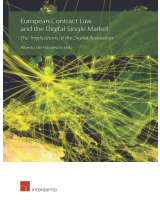
European Contract Law and the Digital Single Market
The Implications of the Digital RevolutionBook | 1st edition 2016 | Europe | Alberto De FranceschiIn light of the EU's commitment to making the Single Market fit for the digital age, leading scholars analyse new and urgent issues in the field of contract, data protection, copyright and private international law.€85.00 incl. VATStudent price: €34.00 -

The French Contract Law Reform: a Source of Inspiration?
Book | 1st edition 2016 | United Kingdom | Sophie Stijns, Sanne JansenThis book results from the Contract Law Workshop of the 20th Ius Commune Conference held 26-27 November 2015. The theme of this Workshop was: ‘The French Contract Law Reform: a Source of Inspiration?’ Since the conference in November 2015, all authors have incorporated comments on the final version of the ordonnance.€89.00 incl. VAT -

Contract Law of the Internal Market
Book | 1st edition 2016 | Europe | Stephen WeatherillThis book examines the European Union’s impact on private and especially contract law. It shows how the European Union’s founding Treaties grant it in principle only a limited competence in the field, but how in practice the European Union’s influence is broad and to some extent unpredictable.€74.00 incl. VATStudent price: €43.00 -
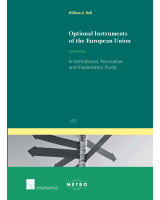
Optional Instruments of the European Union
A Definitional, Normative and Explanatory StudyBook | 1st edition 2016 | Europe | William BullThis rise of a particular kind of European Union legislation known as the ‘optional instrument’ is a novel trend in the context of EU law, and one that until now has not been comprehensively mapped or explored. This study examines and discusses existing and proposed EU Optional Instruments (OIs) in different fields of European law, including company law, intellectual property law and procedural law (such as the European Company, the Community Trade Mark and the European Small Claims Procedure, respectively), as well as contract law.€97.00 incl. VAT -

Share Purchase Agreements
Belgian Law and PracticeBook | 1st edition 2016 | United Kingdom | Bart BellenThis book analyses share purchase agreements governed by Belgian law used for company acquisitions, whereby a purchaser acquires control over a Belgian target company through the acquisition of a controlling shareholding.€200.00 incl. VATStudent price: €59.00 -
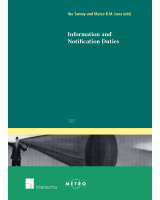
Information and Notification Duties
Book | 1st edition 2015 | United Kingdom | Ilse Samoy, Marco LoosTechnological and economical developments require contracting parties to be informed and advised. This book analyses several aspects of these information and notification duties.€69.00 incl. VAT